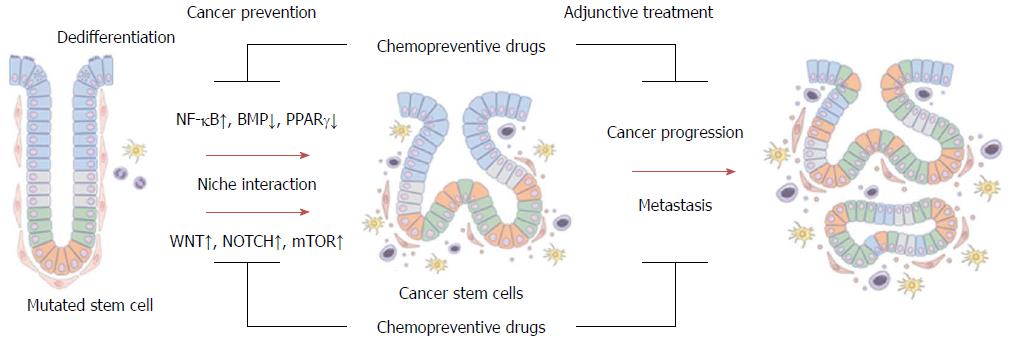Copyright
©2014 Baishideng Publishing Group Co.
World J Gastroenterol. Apr 14, 2014; 20(14): 3835-3846
Published online Apr 14, 2014. doi: 10.3748/wjg.v20.i14.3835
Published online Apr 14, 2014. doi: 10.3748/wjg.v20.i14.3835
Figure 2 Effects of chemopreventive drugs acting on cancer stem cells and their related signaling pathways in colorectal carcinogenesis.
Changes and crosstalk in the stem cells, microenvironment, and metabolism are closely related to essential steps in early carcinogenesis and tumor progression. Mutated stem cells and dedifferentiated stem-like cells can progress to cancer stem cells through dysregulation of stem cell-regulating pathways (Wnt, NOTCH, and BMP), interaction with stem cell niche or tumor microenvironment (inflammatory NF-κB and stromal factor-induced Wnt pathways), and alteration of tumor metabolism [AMP-activated protein kinase (AMPK)/mammalian target of rapamycin (mTOR) pathway]. The major chemopreventive drugs, such as nonsteroidal anti-inflammatory drugs (NSAIDs), statins, PPARγ agonists, and metformin, have cancer stem cell (CSC)-suppressing effects via regulation of these pathways. The development of CSC-suppressing chemopreventive drugs could be useful for adjunctive treatment to avoid relapse or metastasis, as well as more potent chemoprevention in colorectal cancer. PPAR: Peroxisome proliferator-activated receptor; NF: Nuclear factor; BMP: Bone morphogenic protein.
-
Citation: Kim TI. Chemopreventive drugs: Mechanisms
via inhibition of cancer stem cells in colorectal cancer. World J Gastroenterol 2014; 20(14): 3835-3846 - URL: https://www.wjgnet.com/1007-9327/full/v20/i14/3835.htm
- DOI: https://dx.doi.org/10.3748/wjg.v20.i14.3835









